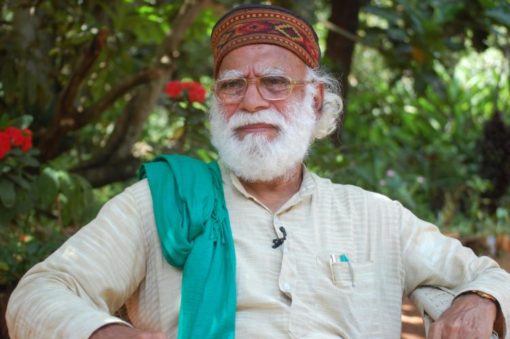 Kadidal Shamanna|The News Minute
Kadidal Shamanna|The News Minute
I interviewed Kadidal Shamanna, the legendary farmer leader in Karnataka. He and his wife Sridevi have been active participants in the people’s movements. They have initiated several reform measures at Bhagavathikere, the village where they began their married life in a small thatched hut.
“Was Matnra Mangalya limited to the Okkaliga community because of the influence of Kuvempu? Were there such marriages in the other communities too?” I asked.
Shamanna said very emphatically, “Yes, in many other communities too, Mantra Mangalya became the choice of many young men and women. After Tejaswi, my sister and I both chose to go through Mantra Mangalya for our marriages after convincing our parents. In fact, a young man from a scheduled caste also opted for Mantra Mangalya and we organized it in the office of the Municipal office.”
“How did your parents and the elder generation react to the revolutionary style of wedding? They must have found it at least bewildering!”
Shamanna said, “Yes, it was new. It demanded a breaking away from so many known traditions and rituals, but in most cases, we were able to persuade them. My father felt hurt that he could not invite a large number of friends and relations to my wedding. But to my surprise, he became a supporter of Mantra Mangalya and started participated in many of them in a few days.
“How big or small was the number of such weddings then?”, I asked.
“The number was big. At least a hundred. One problem was the misconception that Mantra Mangalya could be held only at or near Kuppalli (Kuvempu’s birthplace), so Sundaresh and I would go to such weddings, wherever they were to take place. Once we fell off a bike on our way to such a wedding and somehow managed to ensure that the wedding took place. The parents would insist on one of us being present”.
N D Sundaresh was the young farmer who led the farmers’ movement, along with M D Nanjunswamy, Rudrappa and others.
“Do you really think the Mantra Mangalya can be revived now?”
Sri Devi intervened to say that such weddings have been going on, though in a small number.
Shamanna said, “Yes, I am hopeful. In fact, I am sure. There are many young men and women who want a simple and dignified wedding. They feel inspired by Kuvempu and Tejaswi. But I would also want to be cautious. What is the use if you have a simple wedding and then go back to all other traditional practices? Mantra Mangalya is an initiation into leading a life of rationality, of freedom from caste, creed and all forms of inequality”.
I could see the point Shamanna was making. Mantra Mangalya can also become a public event to advertise one’s progressive views without committing oneself to Kuvempu’s ideals. It remains to be seen whether Kuvempu Pratishtana can keep the radicalism of Kuvempu intact while, encouraging Mantra Mangalya weddings.
Omkar and his friends at Mysore who are associated with Manava Mantapa also expressed a similar view. “We want to ensure that Mantra Mangalya does not become a convenient solution to runaway couples. We would, of course, help them in any case. But we wish that the young men and women would also transform themselves and commit themselves to Kuvempu’s ideals”.
Kuvempu himself had suggested that after signing the Mantra Mangalya document, the couple should ensure that the marriage is registered as per the law of the land. One of the difficulties is that if the registration has to be done under the ‘Hindu Marriage Act’. Some compromises have to be made in following Kuvempu’s instructions.
I met Kadidal Prakash, the secretary of Kuvempu Pratishana at Kuppalli. He said he has been trying to clarify that the proposed centre at Bengaluru is not only for Mantra Mangalya weddings. It is also to be a research centre and a hub for activities relating to Kuvempu’s works.
Read more:
Mantra Mangalya: A Rationalist Wedding Ceremony in Karnataka
Remembering Kuvempu in Times of Unreason
The Cursed Practice of Made Made Snana
Reliving Tagore Through Kuvempu




